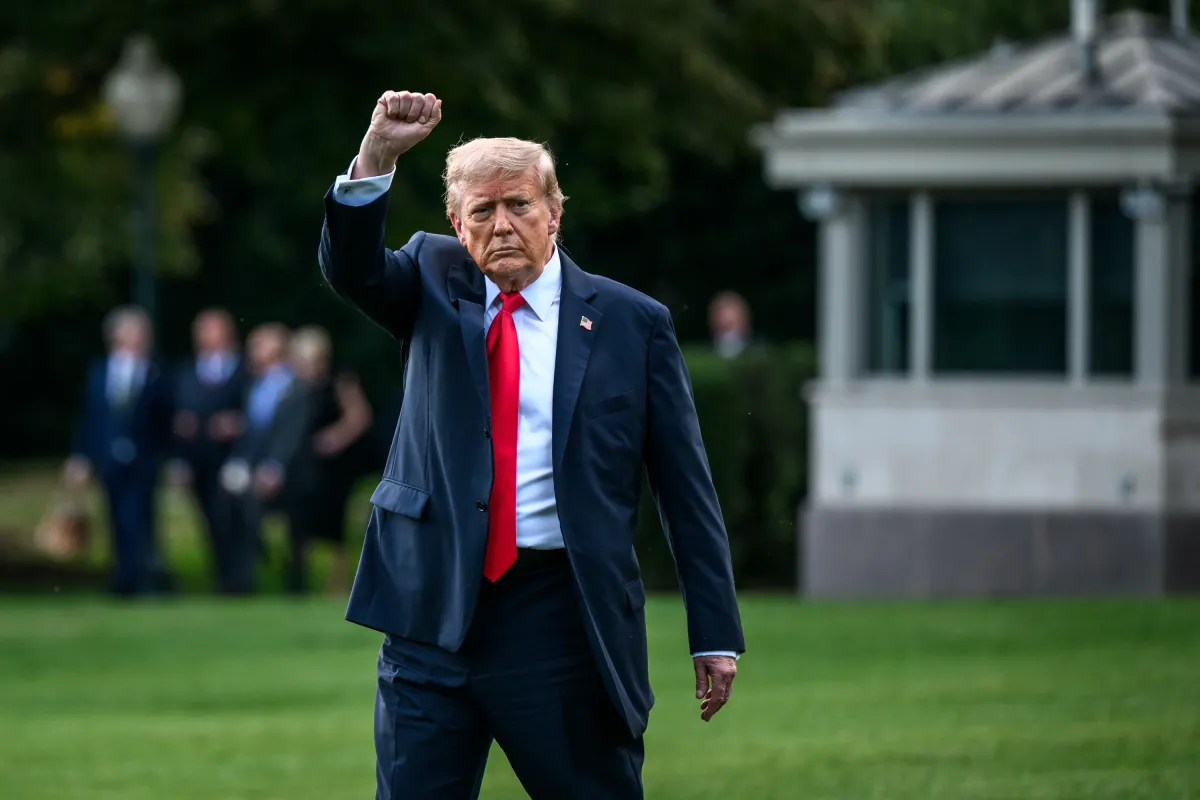The U.S. Senate, often described as the world’s “greatest deliberative body,” has once again rewritten its own rules — this time to make it faster and easier to confirm President Donald Trump’s executive-branch nominees.
In a 53–45 party-line vote, Senate Republicans approved the change late Thursday, stripping away one of the chamber’s long-standing procedural hurdles. The new rule allows nominees to be confirmed in large groups rather than one by one, a shift that could significantly reshape how federal agencies are staffed during Trump’s second term.
For Trump, the move represents another win in his ongoing battle with what he frequently derides as “Washington gridlock.” For Democrats, however, it marks a dangerous erosion of checks and balances, tilting yet more institutional power toward the White House.
A Rule Change with Big Consequences
Before Thursday’s vote, the Senate had to consider each nominee individually — a process that often required hours of floor debate and procedural maneuvering, especially when the minority party chose to resist.
Now, under the revised system, Republicans can package dozens of names into a single “bundle” and approve them in a swift up-or-down vote. While Cabinet secretaries and federal judges remain exempt, the rule will apply to hundreds of positions across the federal bureaucracy — from undersecretaries and agency heads to deputy administrators.
Majority Leader John Thune (R-SD) framed the change as a practical necessity.
“Do you guys like the fact that we’re a personnel department? We spend two-thirds of our time on nominees,” he said on the Senate floor, echoing GOP frustrations that confirmation delays had slowed the administration’s ability to govern.
Democrats countered that efficiency should not come at the expense of accountability.
“This means fewer checks and balances on an executive who is already running roughshod over the law, the Constitution, and basic democratic norms,” argued Sen. Adam Schiff (D-CA).
Senate Minority Leader Chuck Schumer (D-NY) was even more blunt, calling the change a “conveyor belt of unqualified nominees.”
The First Wave of Confirmations
Republicans wasted no time signaling that the rule would be put to use. As early as next week, the Senate could see its first large package of Trump nominees advance under the new process.
One pending nominee, Stephen Miran, tapped to fill a vacancy on the Federal Reserve Board, is still scheduled for a final confirmation vote under the old system. But subsequent appointments — including dozens of undersecretaries at the Departments of Homeland Security, Commerce, and Health and Human Services — are expected to move much more quickly.
The Trump White House, which has often clashed with Senate Democrats over the pace of confirmations, praised the rule change as a “restoration of common sense.” In a statement, Press Secretary Karoline Leavitt said, “For too long, qualified nominees have been delayed by political games. Today’s Senate action ensures that the President can put the best people to work for the American people.”
A Decade of Escalating Rule Changes
Thursday’s decision is only the latest in a series of dramatic shifts that have eroded the Senate’s tradition of protecting minority rights.
-
2013: Under Democratic Majority Leader Harry Reid, Senate Democrats invoked the so-called “nuclear option” to eliminate the 60-vote threshold for most presidential nominations, frustrated by Republican obstruction of President Barack Obama’s picks.
-
2017: Senate Republicans, led by Mitch McConnell, extended the nuclear option to Supreme Court nominees, paving the way for Justice Neil Gorsuch’s confirmation.
-
2025: With Trump back in office and Republicans holding a 53–47 majority, Majority Leader Thune has now pushed through a rule enabling batch confirmations for executive-branch nominees.
What was once unthinkable has become routine: each majority party, when stymied, changes the rules to sidestep the minority. Critics warn that the Senate, once designed as a “cooling saucer” to temper partisan passions, is increasingly resembling the majoritarian House of Representatives.
“This is part of a long-term erosion of Senate norms,” said Dr. Elaine Kamarck, a senior fellow in governance at the Brookings Institution. “The filibuster used to force compromise. Now it’s been chipped away, and each side just escalates when it has the power.”
Republicans See Efficiency, Democrats See Authoritarianism
To Republican leaders, the change is about efficiency and getting the government to function. They argue that Democrats have exploited Senate rules to grind nominations to a halt, sometimes holding up non-controversial candidates for months.
“We were elected to govern,” said Sen. Tom Cotton (R-AR). “That means having people in place to implement the laws we pass. The minority doesn’t get to veto every mid-level appointment because they want to score political points.”
But Democrats view the rule as part of a broader pattern: the consolidation of power in the executive branch under Trump.
“This is about more than nominees,” said Sen. Elizabeth Warren (D-MA). “This is about a president who has already shown a willingness to withhold funds Congress appropriated, to impose tariffs without approval, and to treat the Constitution like a suggestion. Now his allies in the Senate are giving him a rubber stamp to fill the government with loyalists.”
Trump’s Expanding Authority
The rule change comes against the backdrop of Trump’s broader assertion of executive authority during his second term. In recent months, congressional Republicans have largely acquiesced as Trump:
-
Withheld billions in foreign aid that Congress had approved.
-
Expanded tariffs on European and Asian imports without legislative consent.
-
Issued sweeping executive orders reshaping federal labor policies.
Now, with the Senate accelerating confirmations, Trump is poised to gain even more control over the levers of government.
“This is how you hollow out checks and balances,” said Norman Ornstein, a political scientist at the American Enterprise Institute. “By stacking the bureaucracy with loyalists and making it harder for Congress to slow him down, Trump is consolidating a level of control we haven’t seen in modern times.”
A Divided Public Reaction
The rule change has already triggered fierce debate beyond Capitol Hill. Conservative media outlets hailed it as a common-sense fix to what they described as Democratic obstruction.
“Finally, the Senate is working again,” wrote the Washington Examiner editorial board. “Qualified Americans who want to serve their country shouldn’t be pawns in a partisan game.”
Progressive groups, however, blasted the decision as a dangerous precedent. The watchdog group Democracy Forward issued a statement saying, “Republicans have handed Donald Trump a blank check to remake the federal government in his image. The Senate has become a rubber stamp, not a check on executive power.”
On social media, reactions split sharply along partisan lines. Supporters of the president trended the hashtag #LetTrumpWork, while opponents circulated memes portraying the Senate as Trump’s “HR Department.”
What’s at Stake
The implications of the rule change extend far beyond Trump’s current term. Future presidents of either party will also benefit from the streamlined process, meaning the Senate has permanently altered its role in staffing the executive branch.
“This isn’t just about Trump,” said Sarah Binder, a congressional scholar at George Washington University. “It’s about the Senate slowly giving up its power. Once these rules are gone, they rarely come back. The minority party has lost yet another tool to restrain the majority.”
Some Republicans privately acknowledge this risk but argue the benefits outweigh the costs. “When Democrats take power, they’ll have the same tool,” admitted one GOP aide. “But if we don’t act now, the government grinds to a halt.”
Looking Ahead
As soon as next week, Americans may see the first wave of Trump’s nominees — bundled together and approved in record time. For agencies struggling with vacancies, that could mean quicker decision-making and a more fully staffed government.
But for critics, the cost is a Senate that increasingly looks less like the cautious, deliberative body envisioned by the Founders and more like a partisan machine.
“The Senate used to be a check on executive power,” said Sen. Cory Booker (D-NJ). “Today it became an enabler.”

James Jenkins is a celebrated Pulitzer Prize-winning author whose work has reshaped the way readers think about social justice and human rights in America. Raised in Atlanta, Georgia, James grew up in a community that instilled in him both resilience and a strong sense of responsibility toward others. After studying political science and creative writing at Howard University, he worked as a journalist covering civil rights issues before dedicating himself fully to fiction. His novels are known for their sharp, empathetic portraits of marginalized communities and for weaving personal stories with broader political realities. Jenkins’s breakout novel, Shadows of Freedom, won national acclaim for its unflinching look at systemic inequality, while his more recent works explore themes of identity, resilience, and the fight for dignity in the face of oppression. Beyond his novels, James is an active public speaker, lecturing at universities and participating in nonprofit initiatives that support literacy and community empowerment. He believes that storytelling is a way to preserve history and inspire change. When not writing, James enjoys jazz music, mentoring young writers, and traveling with his family to explore cultures and stories around the world.









